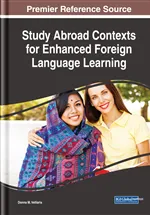Internationalization continues to be on the agenda of higher education (HE) providers worldwide as global student mobility continues to increase. Dr. Donna Velliaris, an esteemed IGI Global editor/author of publications, Handbook of Research on Study Abroad Programs and Outbound Mobility, Study Abroad Contexts for Enhanced Foreign Language Learning, and contributor of 30 IGI Global book chapters, discusses Culturally Responsive Leadership (CRL) for making internationalization real and meaningful in HE settings.
 Internationalization of higher education (HE) contributes to the attainment of global career-readiness competencies desirable in a global economy such as: deep self-awareness; flexibility of thinking; humility; international/open-mindedness; lifelong curiosity; overseas experience; foreign language competence; social justice; sensitivity to cultural diversity; and much more—a mass of skills to prepare students to be members of a global workforce upon graduation.
Internationalization of higher education (HE) contributes to the attainment of global career-readiness competencies desirable in a global economy such as: deep self-awareness; flexibility of thinking; humility; international/open-mindedness; lifelong curiosity; overseas experience; foreign language competence; social justice; sensitivity to cultural diversity; and much more—a mass of skills to prepare students to be members of a global workforce upon graduation.
Today, it is fundamental that higher education institutions (HEIs) are equipped with ‘global’ and culturally responsive leaders (CRLs) who offer a vision of leadership where diversity is transformed from challenge into opportunity. To mitigate the tendency that some educators may have in viewing marginalized students from a deficit perspective, CRLs must provide faculty with the training they need so that students’ home language and cultural norms are not treated as shortfalls, but recognized as qualities to effectively connect with and reach them. A commitment to creative and collaborative actions that are purposeful and well-intentioned—a bridge for teaching and learning.
The primary joy of life is acceptance, approval, the sense of appreciation and companionship of our human comrades. Many men do not understand that the need for fellowship is really as deep as the need for food, and so they go through life accepting many substitutes for genuine, warm, simple relatedness.
—Joshua Loth Liebman
Leadership practices that contribute most to student achievement emanate from those with an inclusive mindset; a vision and belief that all students can achieve at high levels. In other words, CRLs are able to incorporate those governance philosophies, practices, and policies that create inclusive educational environments for students from culturally, ethnically, linguistically, and socioeconomically diverse backgrounds. They are receptive to the many and varied subcultures within their community of learners or otherwise place students at risk of being excluded from the benefits of a quality education. By valuing diversity and preserving the cultural dignity of the community, a culturally responsive environment will ensue, and subsequent cultural proficiency will promote an instructionally-powerful learning climate with academically achieving and engaged students.
The actions of a leader are noticed and interpreted by others as ‘what is important’. A leader who acts with care and concern is more likely to develop a learning culture with similar values. Likewise, a leader who sees themselves as a ‘manager’ or ‘boss’, and believes that all initiatives stem from them, places an implicit stamp of approval on selfish behavior and attitude. Those blinded by their own vision may feel as though they ought to somehow ‘make-their-mark’ and quickly. And, while the socializing task of HE does not lie in replicating cultural dominance and/or social inequalities in the broader community, in general, HEIs are mini-societies that can provide a snapshot of how ‘certain’ adults think about the world.
Other nations of different habits are not enemies: they are godsends. Men require of their neighbours something sufficiently akin to be understood, something sufficiently different to provoke attention, and something great enough to command admiration. We must not expect, however, all the virtues.
—Alfred North Whitehead
Leaders who are concerned with changing their division/faculty culture, must first acknowledge the existing culture; recognize and nurture the ceremonies, rituals, symbols, and traditions that already express and underpin a sense of ‘connectedness’. That is, successful change is more likely to occur when a leader is deeply knowledgeable about: (a) the student population; (b) the professional/non-professional staff; (c) the parent community; and (d) the community in which the institution is situated. Meaningful coalitions with stakeholders contributes to stronger alliances between/among all students, which enhances and advances their educational experiences.
Effectual leaders take responsibility for rethinking curriculum, goals, learning resources, pedagogies, priorities, and assessment methods. Improvement plans should be enacted by CRLs who are able to steer/pioneer endeavors that are focused on ‘long-term outcomes’ rather than ‘short-term returns’. Hence, their vision is critical. Moreover, a vision for creating a healthy and thriving learning culture should be a collaborative undertaking, and it is a leader’s moral imperative to bring members of the community to the point of shared values. In CRL environments, educators are empowered to take risks with instructional practices, initiatives, and programs for students. Thus, the process by which CRLs communicate and share their vision cannot be left to misinterpretation.
Authentic CRLs understand that culture matters and an environment that is accepting provides the opportunity needed to create an ethos of academic excellence. CRLs must maintain a social justice focus centered on providing equity of access to all students with study programs
that meet their cultural, social, and academic needs. All students should have access to the curriculum and be exposed to educational opportunities that equip them to graduate fully prepared to lead productive and successful lives. As Duncan-Andrade and Morrell (2008, p. 52) fittingly stated, ‘nothing promotes border crossing or tolerance more than helping students arrive at an implicit understanding of what they have in common with those they have been taught to perceive as different’.
References:
Duncan-Andrade, J. M. R., & Morrell, E. (2008). The art of critical pedagogy: Possibilities for moving from theory to practice in urban schools. New York, NY: Peter Lang Press.
We would like to thank Dr. Velliaris for sharing her thoughts on culturally responsive leaders and leadership. We hope the discussion will promote further conversations on the topic. Be sure to view her publications, Study Abroad Contexts for Enhanced Foreign Language Learning and Handbook of Research on Academic Misconduct in Higher Education, and recommend them to your librarian.
Dr. Velliaris's research is available through IGI Global’s InfoSci®-Books, a database of 4,500+ reference books containing nearly 100,000 chapters focusing on emerging research. With an annual subscription price offered as low as US$ 8,580 US$ 6,435*, (perpetual purchase offered as low as US$ 17,500 US$13,125**), this research database offers advanced features including: full-text HTML and PDF viewing options, unlimited simultaneous users, no DRM, no embargo of content (research is available months in advance of print release), full publication downloads, RefWorks, EasyBib, spell-check and auto-complete search suggestions, and a multi-lingual user interface, plus many more, ensure that the research within InfoSci-Books can be easily integrated in course syllabus, personal research, and professional development. This comprehensive database provides the timeliest, peer-reviewed research that spans across 350+ topics in 11 core subject areas, including business and management, computer science, education, engineering, social sciences and humanities, and more.
Additionally, when an institution invests in IGI Global’s InfoSci-Books and InfoSci®Journals databases, they can take advantage of IGI Global’s Open Access (OA) (Offset Model) Initiative which will provide an additional source of OA article processing charges (APCs) and enable researchers of that institution to have their OA APCs waived when their research is accepted into an IGI Global journal.**
Purchase or recommend IGI Global’s InfoSci-Books to your institution’s librarian.
Find below a sample of related titles which are also featured in IGI Global’s InfoSci-Books Database:
About Dr. Donna Velliaris
 Donna M. Velliaris is currently living and working in Singapore while her two young children attend an international school. A fully qualified [Australia] secondary school educator since 1995, she has a total of 12 officially registered subjects/skills across Grades 8-12. To date, she has taught students from Reception to PhD level and across several continents. Dr Velliaris holds two Graduate Certificates: (1) Australian Studies; and (2) Religious Education, two Graduate Diplomas: (1) Secondary Education; and (2) Language and Literacy Education, as well as three Master’s degrees: (1) Educational Sociology; (2) Studies of Asia; and (3) Special Education. In 2010, Dr Velliaris graduated with a PhD in Education focused on the social/educational ecological development of school-aged transnational students in Tokyo, Japan.
Donna M. Velliaris is currently living and working in Singapore while her two young children attend an international school. A fully qualified [Australia] secondary school educator since 1995, she has a total of 12 officially registered subjects/skills across Grades 8-12. To date, she has taught students from Reception to PhD level and across several continents. Dr Velliaris holds two Graduate Certificates: (1) Australian Studies; and (2) Religious Education, two Graduate Diplomas: (1) Secondary Education; and (2) Language and Literacy Education, as well as three Master’s degrees: (1) Educational Sociology; (2) Studies of Asia; and (3) Special Education. In 2010, Dr Velliaris graduated with a PhD in Education focused on the social/educational ecological development of school-aged transnational students in Tokyo, Japan.
Her primary research interests include: human ecology; Third Culture Kids (TCKs); schools as cultural systems; and study abroad. With recent publication of almost 30 book chapters, titles comprise: Academic reflections: Disciplinary acculturation and the first-year pathway experience in Australia [Garnet]; Conceptualizing four ecological influences on contemporary ‘Third Culture Kids’ [Palgrave Macmillan]; Culturally responsive pathway pedagogues: Respecting the intricacies of student diversity in the classroom [IGI Global]; The other side of the student story: Listening to the voice of the parent [Sense]; and Metaphors for transnational students: A moving experience [Cambridge Scholars].
Publisher’s note: This article was written by Dr. Donna Velliaris on the benefits of culturally responsive leadership in higher education. The following work does not reflect the views of IGI Global.
Newsroom Contact
Caroline Campbell
Marketing Manager
ccampbell@igi-global.com
(717) 533-8845, ext. 144
www.igi-global.com/
*InfoSci-Books US$ 6,435 annual subscription price is only available to new customers through IGI Global’s Library Account Program, and cannot be combined with most offers or multi-site use.
**Perpetual purchase option reflects pricing for all InfoSci-Books 2019 (600+ titles) pricing for existing customers.
**The Open Access (OA) article processing charge will be waived after the student, faculty, or staff’s paper has been vetted and accepted into an IGI Global journal.